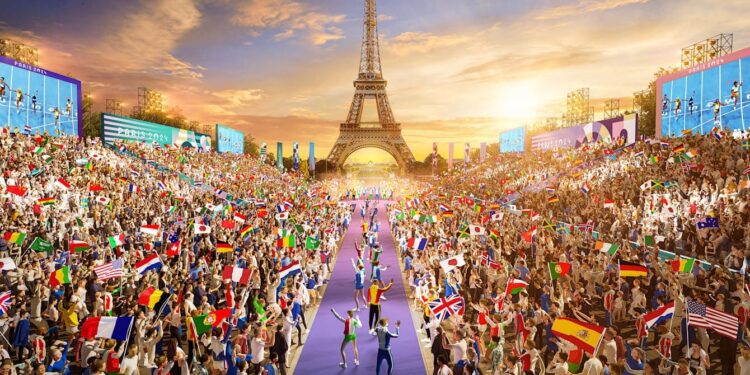As the French capital prepares to host its third Olympic Games, starting on 26 July, 2024, the event is already embroiled in a series of controversies and challenges. Paris Olympics 2024: Controversies and Challenges Facing the Games encompass a range of issues from political tensions to environmental concerns, putting organizers and the International Olympic Committee (IOC) under scrutiny.
One of the most contentious issues surrounding the Games is France’s decision to ban its athletes from wearing the hijab during competition. This move, announced by then-Sports Minister Amelie Oudea-Castera in September, aims to uphold the country’s principles of secularism and ensure “absolute neutrality in public services.” However, this stance has sparked widespread criticism and protests, particularly given that France is home to one of Europe’s largest Muslim populations. The ban highlights the ongoing debate about religious expression in public spaces and sports.
While French athletes face this restriction, the IOC has confirmed that there will be no such ban in the Olympic Village, allowing athletes to wear religious attire freely in that space. This discrepancy between national and Olympic policies underscores the complex interplay between local laws and international sporting events.
Another significant controversy surrounding Paris Olympics 2024: Controversies and Challenges Facing the Games is the call to ban Israel from participating. In light of the ongoing conflict in Gaza, where tens of thousands of Palestinians have been killed, pro-Palestinian activists and supporters have urged the IOC to exclude Israel from the Games. These calls cite accusations of genocide against Israel, as brought forward by South Africa in the International Court of Justice. Despite these pressures, IOC President Thomas Bach has firmly stated that there is no question about Israeli participation in the Olympics.
The preparation for the Games has also been marred by concerns over workers’ rights and safety. France has a troubling record in workplace safety, ranking as the fourth deadliest country in Europe for workers and reporting the highest number of workplace accidents in the European Union. The Olympic construction projects have not been immune to these issues, with reports of numerous accidents, including serious ones. Labor unions have been vocal in demanding better conditions and wages for workers involved in Olympic preparations.
Adding to the list of challenges is a potential strike by aviation workers at Paris airports. Unions have announced a one-day stoppage on July 17, just as athletes are set to begin arriving en masse. This labor dispute, centered around demands for higher Olympic bonuses and increased staffing, threatens to disrupt the smooth operation of the Games if not resolved promptly.
Environmental concerns have also come to the forefront, particularly regarding the water quality of the River Seine. The iconic river, set to be a centerpiece of the Games’ opening ceremony and venue for swimming events, has failed several water quality tests. Despite recent assurances from Paris City Hall that the water quality has improved, previous tests showed levels of E. coli bacteria far exceeding acceptable limits. This situation has raised questions about the safety of athletes participating in water events and the effectiveness of the city’s efforts to clean up the river.
The participation of Russian and Belarusian athletes remains a delicate issue. Following Russia’s invasion of Ukraine in 2022, athletes from these countries were initially banned from international competitions. The IOC has since allowed their gradual return under a neutral banner, subject to strict conditions. However, the number of athletes from these countries accepting invitations to compete as neutrals is significantly lower than in previous Olympics, reflecting the ongoing tensions surrounding their participation.
These athletes face numerous restrictions, including being barred from team events, wearing national colors, or being included in the medals table. The IOC’s decision to allow their participation, even under these conditions, has been met with criticism from various quarters, including Ukrainian President Volodymyr Zelenskyy, who argues that neutrality is impossible in the current geopolitical context.
As Paris gears up for the Olympics, these controversies and challenges underscore the complex interplay of politics, culture, and sport that often characterizes major international events. The organizers and the IOC face the daunting task of navigating these issues while ensuring the Games proceed smoothly and maintain their spirit of international cooperation and athletic excellence.
The success of Paris Olympics 2024: Controversies and Challenges Facing the Games will likely be judged not only by the sporting achievements but also by how effectively these various challenges are addressed. From balancing religious expression and secularism to ensuring worker safety and environmental standards, the Paris Olympics are set against a backdrop of significant social and political issues.
As the world turns its attention to Paris, the coming weeks will be crucial in determining how these controversies are resolved and what impact they may have on the Games themselves. The organizers’ ability to address these concerns while delivering a memorable Olympic experience will be closely watched by athletes, spectators, and the international community alike.
Related Articles:
















